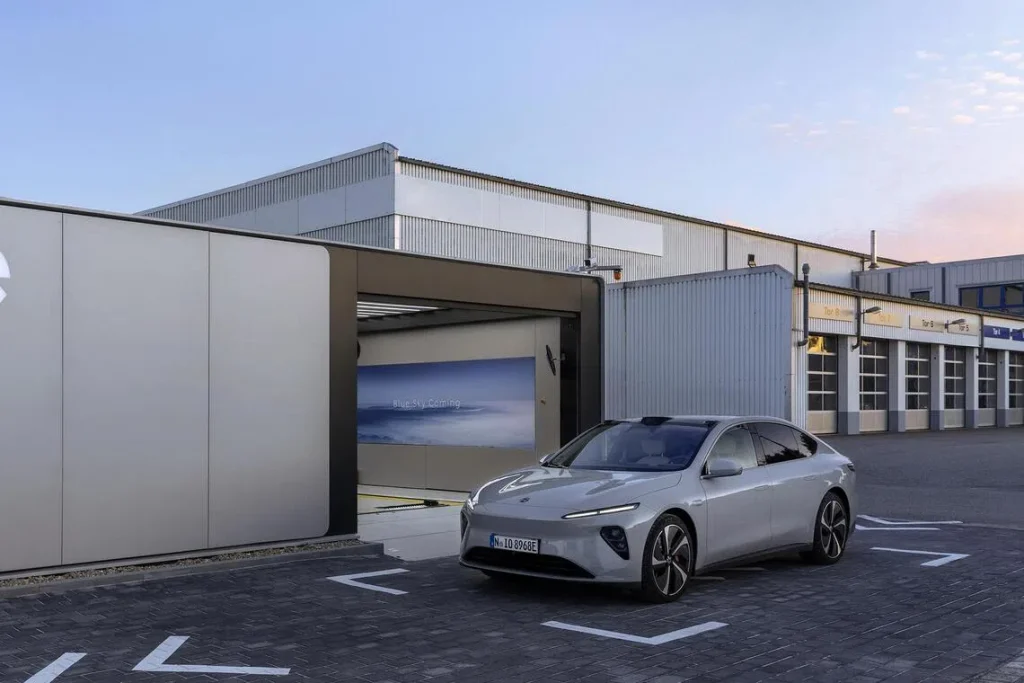Listen to the article
Singapore’s sovereign wealth fund GIC has filed a lawsuit against Chinese electric vehicle maker Nio, alleging securities law violations through revenue inflation practices. The legal action, initiated in August in the Southern District of New York, names the company along with CEO Li Bin and former CFO Feng Wei as defendants.
News of the lawsuit sent Nio’s Singapore-listed shares tumbling by as much as 13.8% to US$6.00 on October 16, though the stock partially recovered to trade at US$6.40 later in the day, still down 8.1%.
At the center of GIC’s allegations are claims that Nio made “materially false and/or misleading statements” regarding its relationship with an affiliated company called Nio Battery Asset, known in Chinese as Weineng. The lawsuit contends that Nio failed to disclose crucial information about its business operations and financial practices.
GIC’s complaint focuses on Nio’s innovative battery subscription model, which allows customers to purchase electric vehicles without batteries and instead pay recurring fees to access the company’s battery-swap station network. According to the lawsuit, Weineng’s financial records reveal that it purchased batteries directly from Nio, enabling the EV maker to record the full revenue from these sales immediately—despite end users not having paid for the batteries yet.
The lawsuit argues that this accounting approach artificially inflated Nio’s financial performance, as such income should have been recognized gradually rather than as lump-sum payments. GIC claims these practices caused the fund to suffer “significant losses” due to artificially inflated securities values.
When contacted, Nio did not immediately respond to requests for comment, while GIC declined to comment on the matter to Bloomberg. Court records show that a judge has stayed the case as it bears similarities to a previous lawsuit filed against Nio in 2022.
Founded in 2014, Nio was once heralded as China’s answer to Tesla and a rising star in the global EV industry. The company gained attention for its battery swap technology, which allows drivers to exchange depleted batteries for fully charged ones in minutes instead of waiting for recharging. While innovative, this business model requires significant capital investment in battery swap infrastructure across China.
The controversy around Nio’s accounting practices first gained public attention in 2022 when New York-based Grizzly Research published a report detailing these issues. According to court filings, Nio responded at the time by announcing plans to launch an independent committee to investigate the claims.
GIC’s lawsuit states that following the Grizzly Research report, Nio’s American depositary notes plunged in value, resulting in substantial losses for investors. The Singaporean fund is seeking compensation for all losses related to Nio’s alleged wrongdoing, along with reimbursement of legal costs.
The investment relationship between GIC and Nio dates back to March 2017, when the Singaporean fund participated in Nio’s Series C funding round that raised 600 million yuan (approximately $109 million today).
This lawsuit comes at a challenging time for China’s electric vehicle sector, which faces increasing competition, margin pressure, and potential overcapacity concerns. Chinese EV makers have been expanding globally while simultaneously dealing with regulatory scrutiny both at home and in international markets.
For GIC, one of the world’s largest sovereign wealth funds with an estimated $700 billion in assets under management, the legal action against Nio represents an unusual public confrontation with a portfolio company, highlighting the seriousness with which the fund views the alleged securities violations.
Fact Checker
Verify the accuracy of this article using The Disinformation Commission analysis and real-time sources.




9 Comments
Interesting developments in the EV space. Nio’s battery subscription model seems innovative, but these allegations of revenue inflation are concerning. I wonder what the fallout will be for the company and its leadership.
Agreed, these are serious allegations that could really damage Nio’s reputation and investor confidence. It will be important to see how the legal proceedings unfold.
As an investor, I’m closely watching this situation unfold. The battery swap technology is intriguing, but the alleged financial irregularities are very worrying. Nio will need to provide a convincing defense to regain market confidence.
Agreed. Investors will demand a full accounting and explanation from Nio’s leadership. Any signs of further deception or mismanagement could be very damaging for the company’s long-term prospects.
The battery subscription model is an interesting approach, but these claims of revenue inflation are quite concerning. I wonder if this could set a precedent for increased regulatory scrutiny of EV startups and their accounting practices.
That’s a good point. This lawsuit could prompt a closer look at the financial reporting and disclosures of other EV companies, particularly those with innovative business models. Transparency will be key going forward.
This is a complex issue that highlights the challenges facing the EV industry. Innovative business models like Nio’s battery subscription can be disruptive, but they also carry heightened regulatory and financial risks. It will be crucial for the company to address these allegations head-on.
This is another reminder of the risks and complexities involved in emerging tech companies, especially in the volatile EV market. Shareholders will be closely watching to see how Nio responds to GIC’s lawsuit.
Absolutely. Allegations of financial impropriety can quickly erode trust and shareholder value. Nio will need to mount a robust defense to restore confidence if they hope to weather this storm.